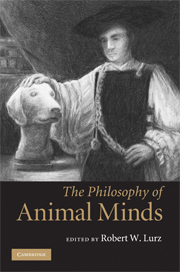Book contents
- Frontmatter
- Contents
- List of contributors
- Acknowledgments
- The philosophy of animal minds: an introduction
- 1 What do animals think?
- 2 Attributing mental representations to animals
- 3 Chrysippus' dog as a case study in non-linguistic cognition
- 4 Systematicity and intentional realism in honeybee navigation
- 5 Invertebrate concepts confront the generality constraint (and win)
- 6 A language of baboon thought?
- 7 Animal communication and neo-expressivism
- 8 Mindreading in the animal kingdom
- 9 The representational basis of brute metacognition: a proposal
- 10 Animals, consciousness, and I-thoughts
- 11 Self-awareness in animals
- 12 The sophistication of non-human emotion
- 13 Parsimony and models of animal minds
- 14 The primate mindreading controversy: a case study in simplicity and methodology in animal psychology
- Glossary of key terms
- References
- Index
9 - The representational basis of brute metacognition: a proposal
Published online by Cambridge University Press: 05 June 2012
- Frontmatter
- Contents
- List of contributors
- Acknowledgments
- The philosophy of animal minds: an introduction
- 1 What do animals think?
- 2 Attributing mental representations to animals
- 3 Chrysippus' dog as a case study in non-linguistic cognition
- 4 Systematicity and intentional realism in honeybee navigation
- 5 Invertebrate concepts confront the generality constraint (and win)
- 6 A language of baboon thought?
- 7 Animal communication and neo-expressivism
- 8 Mindreading in the animal kingdom
- 9 The representational basis of brute metacognition: a proposal
- 10 Animals, consciousness, and I-thoughts
- 11 Self-awareness in animals
- 12 The sophistication of non-human emotion
- 13 Parsimony and models of animal minds
- 14 The primate mindreading controversy: a case study in simplicity and methodology in animal psychology
- Glossary of key terms
- References
- Index
Summary
INTRODUCTION
Self-confidence is based on two sources. One is the current evidence on which our judgments are built – i.e., on the way the world is. A second source of confidence comes from evaluating one's past ability to reach true judgments. Is such a reflexive ability uniquely human? Surprisingly, the answer is no: there is growing evidence that some non-human animals who have not evolved any mindreading capacity, such as macaques and dolphins, are able to evaluate appropriately their self-confidence level in perceptual and memory tasks. This result is quite surprising, and suggests interesting new hypotheses about the evolution of the mind, the role of non-conceptual content in self-knowledge, the foundations of rational decision-making, and epistemology.
The set of dispositions that allow self-confidence to develop over time as a consequence of prior mental exercise has been studied in detail by experimental psychology, under the heading “Metacognition.” This term, however, has also been used independently by philosophers and cognitive scientists interested in the philosophy of mind to designate the ability to form mental concepts referring to one's own intentional states or to oneself as a cognitive agent. Thus the two communities are presently using the word “metacognition” to refer, respectively, to the ability to control and monitor one's own cognition, and to the ability to attribute mental states to oneself and others.
Keywords
- Type
- Chapter
- Information
- The Philosophy of Animal Minds , pp. 165 - 183Publisher: Cambridge University PressPrint publication year: 2009
- 11
- Cited by

